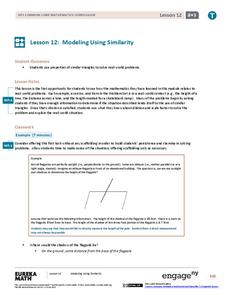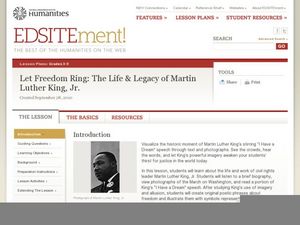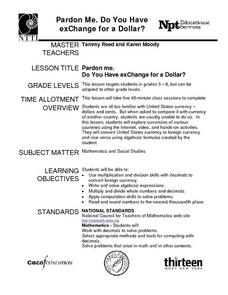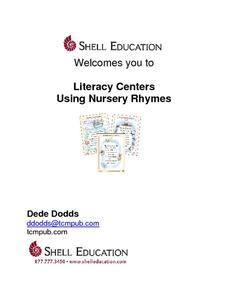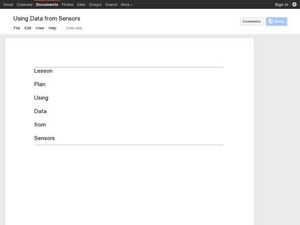EngageNY
Modeling Using Similarity
How do you find the lengths of items that cannot be directly measured? The 13th installment in a series of 16 has pupils use the similarity content learned in an earlier resource to solve real-world problems. Class members determine...
EngageNY
Using Tree Diagrams to Represent a Sample Space and to Calculate Probabilities
Cultivate the tree of knowledge using diagrams with two stages. Pupils create small tree diagrams to determine the sample space in compound probability problems. The lesson uses only two decision points to introduce tree diagrams.
University of Washington
Using Modeling to Demonstrate Self-Assembly in Nanotechnology
Do polar opposites attract? After an introduction on the polarity of molecules, pupils are asked to design a self-assembling model using materials with different polarity. The challenge should motivate learners to develop a workable...
Centers for Disease Control and Prevention
What You Need to Know about Marijuana Use and Pregnancy
Some people believe that using marijuana during pregnancy is safer than smoking tobacco, but studies show several negative impacts on babies whose mothers used marijuana while they were pregnant. Use a fact sheet to educate learners...
EngageNY
Ferris Wheels—Using Trigonometric Functions to Model Cyclical Behavior
Have class members going in circles as they model the path of a Ferris Wheel using trigonometric functions. Building on the previous lesson in this series on transformations, learners use trigonometric functions to model wheels of...
Curated OER
Let Freedom Ring: The Life & Legacy of Martin Luther King, Jr.
Students use text and photos to visualize the delivery of Dr. Martin Luther King, Jr.'s historic "I Have A Dream" speech. They analyze Dr. King's speech for examples of imagery and allusion and create original poetry and illustrations...
Curated OER
ESL Grammar: Have to/Don't Have to
In these English Language grammar worksheets, learners complete several exercises that help them learn to write the positive or negative form of 'have to.' Students write sentences use 'have to' or 'don't have to' depending on the...
Teach Engineering
Solving Energy Problems
Here's your chance to save the world. The eighth lesson in a 25-part Energy Systems and Solutions unit has young scientists come up with ideas for individual or group projects. They identify ways to solve the energy crisis. Hope they...
Howard Hughes Medical Institute
Mapping Genes to Traits in Dogs Using SNPs
Genetic analysis has gone to the dogs! Learners use real DNA information collected from dog saliva to study the relationship between genotypes and phenotypes. They analyze alleles to determine correlations to coat color, length, and...
Curated OER
Land Use Decision
Students identify social and ecological considerations where human uses of land and trees conflict with each other and ecosystem needs, and describe importance of land-use management and planning through role play.
Curated OER
I Have Who Has Cards - Integration Formulas
In this calculus worksheet, students rewrite a word problem using algebraic symbols and calculate the derivative of a function to find the correct solution. There are 20 matching questions with an answer key.
Curated OER
I Have a Metaphor
Learners locate the literary devices used in Martin Luther King Jr.'s "I Have a Dream" speech. In this figurative language lesson plan, students first distinguish between similes, metaphors, analogies, personification, etc. Learners...
Curated OER
Alexander Used to Be Rich
Reading Alexander, Who Used to Be Rich Last Sunday, launches this lesson appropriate for children who recognize coins and have been introduced to coin values. Using addition and subtraction skills, the class tracks Alexander’s spending...
National Wildlife Federation
Quantifying Land Changes Over Time Using Landsat
"Humans have become a geologic agent comparable to erosion and [volcanic] eruptions ..." Paul J. Crutzen, a Nobel Prize-winning atmospheric chemist. Using Landsat imagery, scholars create a grid showing land use type, such as urban,...
Curated OER
Using Google Docs
This is a fantastic resource for teachers to have in their tool belts upon entering into the world of using Google Docs in the classroom! It is a reference sheet with step-by-step instructions and graphics for everything from basic...
MathMovesU
Practice: Measuring Angles and Using a Protractor and More!
Four fabulous worksheets are included in this resource, all having to do with the measurement of angles. On the first, anglers will use a protractor to determine the degrees of 10 different angles. An arc is drawn on each. On the second,...
Curated OER
Making Use of Gerunds
Don't let the number of slides here overwhelm you! This presentation is packed with accurate, detailed and clear explanations. It has several opportunities for practice, but make sure you run through the presentation a few times to feel...
Curated OER
Pardon Me. Do You Have Change For a Dollar?
Upper elementary and middle school learners explore currencies from a variety of countries. They use the Internet, video, and engage in hands-on activities. They practice converting U.S. currency to foreign currency and vice versa. This...
Incredible Art
Historical Narrative Using Silhouettes
Connect art and history with a series of activities inspired by the work of contemporary artist, Kara Walker. After watching an Art 21 video about Walker and examining the images in a PowerPoint presentation, class members use...
Curated OER
Teaching the Instruments of the Orchestra to Young Students using the San Francisco Symphony Kids’ Website
Using the San Francisco Children's Orchestra web site, first graders build listening and instrument identification skills. Each child wears head phones, listens to ID, and finds various instruments on the included worksheet.
Curated OER
Literacy Centers Using Nursery Rhymes
And in this corner we have Little Jack Horner. Engage your learners with phonemic awareness activities that encourage them to play with language. Eight different categories of phonemic awareness activities are detailed in the resource...
Curated OER
Using Data from Sensors
Beginning with a discussion about using technology to collect data, this resource includes a video about the next Mars rover as an example. Young scientists are taught that filtering is necessary before collected data can be analyzed....
American Chemical Society
Using Color to See How Liquids Combine
Blue-tinted water is added to unknown liquids that have been tinted yellow to find out how they interact. This is a memorable activity that is part of an investigation on the properties of liquids, which is part of a unit on the...
Curated OER
Using a Hundreds Chart
Youngsters participate in three activities using the hundreds chart. They will choose numbers to add up to one hundred. Whoever gets the most combinations wins. Two variations of the game are supplied.
